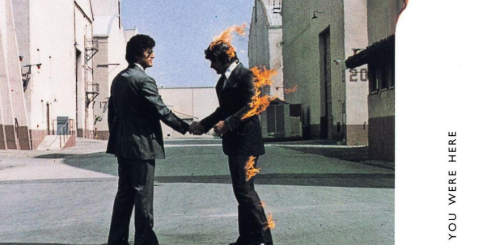When the Tigers Broke Free by Pink Floyd Lyrics Meaning – Unmasking the Haunting Echoes of War
Lyrics
One miserable morning in black ‘forty four
When the forward commander
Was told to sit tight
When he asked that his men be withdrawn
And the Generals gave thanks
As the other ranks held back
The enemy tanks for a while
And the Anzio bridgehead
Was held for the price
Of a few hundred ordinary lives
And kind old King George
Sent mother a note
When he heard that father was gone
It was, I recall
In the form of a scroll
With gold leaf adorned
And I found it one day
In a drawer of old photographs, hidden away
And my eyes still grow damp to remember
His Majesty signed
With his own rubber stamp
It was dark all around
There was frost in the ground
When the tigers broke free
And no one survived
From the Royal Fusiliers Company Z
They were all left behind
Most of them dead
The rest of them dying
And that’s how the High Command
Took my daddy from me
Evocative and haunting, ‘When the Tigers Broke Free’ stands out in Pink Floyd’s rich catalog not so much for its instrumental virtuosity but for its harrowing narrative and the deep personal history it encapsulates. The song, as piercing as any battlefield cry, serves as an elegy, a historical document, and a raw slice of emotional memoir.
With its poignant lyrics suffused with the weight of history and personal loss, Pink Floyd transports us to a moment where the terrors of war and the agony of personal grief coalesce. This track, often overshadowed by the band’s more commercially celebrated hits, demands a deeper analysis to truly appreciate the intricate tapestry woven by Roger Waters’ solemn words and the somber notes that frame them.
A Personal War: Unveiling Roger Waters’ Haunting Tribute
While Pink Floyd is synonymous with psychedelic rock and introspective exploration, ‘When the Tigers Broke Free’ reveals another dimension of Roger Waters’ songwriting. It stands as a powerful homage to his father, Eric Fletcher Waters, who perished during World War II in the Battle of Anzio. Stripped of the band’s usual sonic experimentation, the song speaks directly and devastatingly to the unchecked ravages of war.
It’s no mere historical recounting; Waters weaves in the personal impact this loss had on his family, illustrated most poignantly through the description of a condolence note from King George. It’s a stark reminder of the chasm between the formalities of state and the churning grief within a household bereft of a father, a husband.
The Echoes of ’44: Dissecting the Song’s Historical Context
The Battle of Anzio, a crucial and bloody WWII campaign, serves as the backdrop of this somber narrative. By bringing this specific incident to the surface, Waters transports listeners back to a pivotal moment in history that, even in victory, savored of a pyrrhic triumph at best.
This reference to a ‘miserable morning in black ‘forty four’ situates us firmly on the battlefield, revealing the cruel arbitrariness of warfare, where the fate of many is decided by the whims of a few. Waters critiques these military decisions that gamble with lives, drawing a perimeter around the tragedy that such commands inevitably cause.
Hidden Meanings – Deciphering Waters’ Symbolism
‘When the tigers broke free’ serves as a powerful metaphor for the unpredictable and ferocious nature of warfare. Tanks, referred to as ‘tigers’ here, become beasts of destruction breaking the lines of defense. The lyrics paint them as almost sentient and savage beasts, unbound by the rules of the natural world and entirely merciless.
Furthermore, Waters employs the image of his father’s death certificate adorned in ‘gold leaf.’ This juxtaposition of regal pomp against the backdrop of his father’s ultimate sacrifice delivers a punishing irony. It speaks to the broader theme of the indifferent pageantry of war acknowledgment amid the raw anguish and irreplaceable human loss.
Memorable Lines – Lyrical Labyrinth of Loss
The line ‘And that’s how the High Command took my daddy from me’ sears with its painful candor. Waters does not spare listeners the indignation and bitterness that accompany the narrative of a child stripped of a parent. Underneath the surface of these words is an entire realm of revolutionary fervor and distrust of authoritarian systems.
This song articulates an unbridled critique of the systems that propagate war without consideration for the human lives at stake. Each line is a thread in the tapestry of loss, strung tightly with the potent mix of personal vendetta and universal lamentation.
Legacy of Agony: How ‘When the Tigers Broke Free’ Reverberates Today
While released decades ago, the song remains a plaintive symbol regarding the continual toll of warfare. Listeners are left to confront not just the horrors of World War II but to reflect on how this narrative replicates itself in contemporary conflicts across the globe.
By venerating his father’s memory and simultaneously denouncing the mechanics of war, Waters creates an anthem that resists being merely historical. It stands as a timeless testament to those personally carved by war’s unyielding blade – a piece that resonates with anyone who has been touched by the ripples of conflict.








